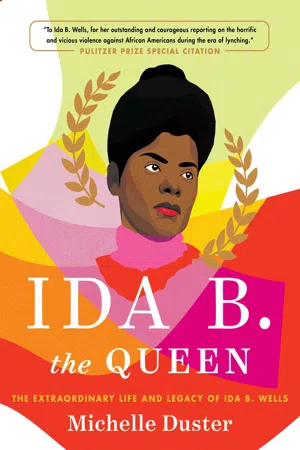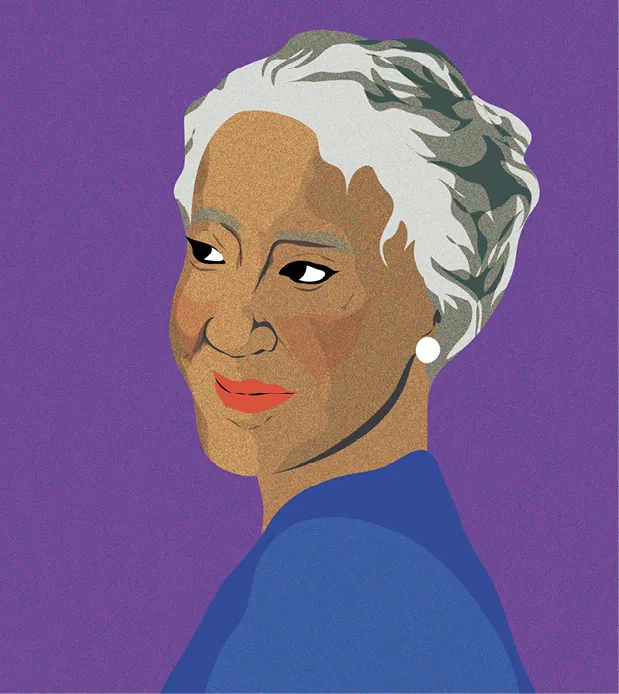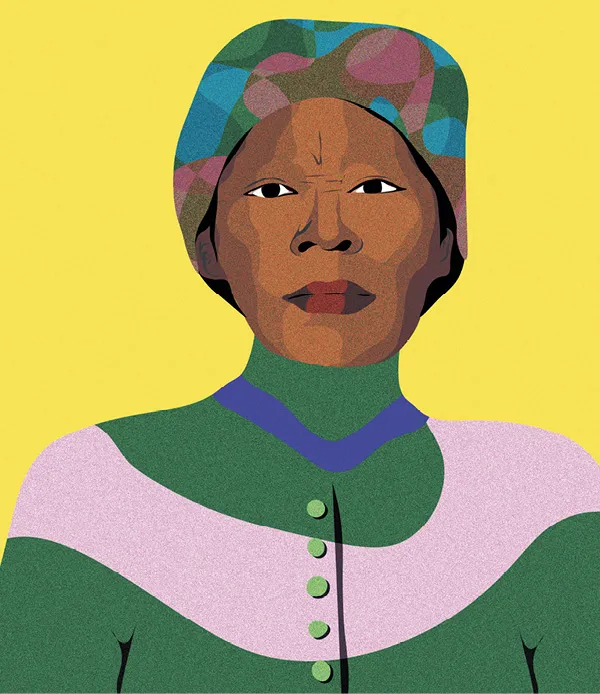![]()
I. Who Was Ida B. Wells?
There must always be a remedy for wrong and injustice if we only know how to find it.
—Ida B. Wells
Dangerous Negro Agitator
In the late 1910s, the Federal Bureau of Investigation updated its file that tracked a woman who’d been born into slavery in Holly Springs, Mississippi. This second report, registered the year after her FBI file was first created, came with a decisive declaration about Ida B. Wells-Barnett:
We have on file quite a few reports from different cities, where she has addressed meetings of colored people and endeavored to impress upon them that they are a downtrodden race and that now is the time for them to demand and secure their proper position in the world. She is a very effective speaker and her influence among the colored race is well recognized.
I believe she is considered by all of the Intelligence officers as one of the most dangerous negro agitators, and it would seem that her case should be considered very carefully before she is given a passport to the Peace Conference.
The strongly worded letter worked. Ida, among several others, was denied the passport she would need to travel to an overseas conference that had been organized after the end of World War I. She believed African Americans deserved a representative at the Peace Conference in Paris, and that any written resolution should include a “racial equality clause.”
Though neither President Woodrow Wilson nor the FBI agreed with her, the need for this clause seemed obvious to Ida: How could American delegates travel to France to discuss the importance of peace when their own country treated a whole race of its own citizens so poorly?
Born in 1862, Ida B. Wells-Barnett dedicated her life to exposing the hypocrisy at the core of America’s vision of itself. How could the so-called land of the free be somewhere that saw the lynchings of countless Black people? How could a country that called itself a world leader be so far behind others in its treatment of women?
These were difficult questions, and Ida addressed them in multiple ways, over decades. She wrote articles that took up causes big and small; she gave speeches around the country and across the ocean over the course of her life that earned her plenty of enemies. Like many other African American activists throughout history, Ida was branded “radical” for speaking out against racism, sexism, economic exploitation, and lawlessness.
Throughout her life, Ida accomplished an awe-inspiring set of achievements. She edited and co-owned newspapers at a time when Black people, and especially Black women, faced tremendous barriers. She wrote influential articles decrying the Jim Crow laws that enforced racial segregation. She led campaigns against the everyday violence that struck terror in the hearts of Black people around the country: while living in Memphis in 1892, at the age of thirty, she urged African Americans to leave the town after a heinous killing of three Black men who’d been seized by a mob of dozens of white men. The only thing the men were guilty of was owning a successful business that economically threatened their white counterpart.
Ida was shaken by the deaths of these men, who had been her friends, and resolved to crusade against the routine horror of lynchings. She became a pioneer in what we think of now as investigative journalism, interviewing people associated with lynchings in any capacity and attempting to secure justice for victims even when police seemed disinterested in their cases. She wouldn’t rest until the truths were made public: Black men, and women, were being targeted for “crimes” as minor as “being saucy to white people.” Time and time again, the mobs of white people who killed them were never held accountable.
The abolitionist Frederick Douglass, whose own autobiography became a seminal antislavery text, wrote her a letter in 1892 expressing his profound appreciation of her writings. Ida used this moment to bolster the work of protecting her community, too. She published Douglass’s letter in her pamphlet Southern Horrors: Lynch Law in All Its Phases. It read, in part:
Dear Miss Wells:
Let me give you thanks for your faithful paper on the lynch abomination now generally practiced against colored people in the South. There has been no word equal to it in convincing power. I have spoken, but my word is feeble in comparison. You give us what you know and testify from actual knowledge. You have dealt with the facts with cool, painstaking fidelity and left those naked and uncontradicted facts to speak for themselves.
Brave woman! you have done your people and mine a service which can neither be weighed nor measured. If American conscience were only half alive, if the American church and clergy were only half christianized, if American moral sensibility were not hardened by persistent infliction of outrage and crime against colored people, a scream of horror, shame and indignation would rise to Heaven wherever your pamphlet shall be read.
Ida worked alongside and often challenged the views of Douglass, as well as those of her contemporaries. Along with W. E. B. Du Bois and Mary Church Terrell, Ida was one of the founders of the National Association for the Advancement of Colored People (NAACP). Madam C. J. Walker provided support for the antilynching efforts. Ida supported Marcus Garvey with his Universal Negro Improvement Association. She also worked closely with William Monroe Trotter and his National Equal Rights League. She traveled far and wide across the United States and the United Kingdom speaking about lynching in her fight for justice.
Frederick Douglass (circa 1879). The abolitionist praised Ida B. Wells’s work throughout his life, and often supported it with financial contributions and introductions to other notable activists.
Together with Josephine St. Pierre Ruffin (top), Mary Church Terrell (middle), and Harriet Tubman (bottom), Ida B. Wells created a national organization to support the rights of Black women.
As a Black woman, she had to fight two battles—racism and sexism—and she did so tirelessly. After moving to New York City and then Chicago, Ida championed African American women’s causes at a time when most white women excluded them from some of the considerations of the suffrage movement. Along with women such as Mary Church Terrell, Harriet Tubman, and Josephine St. Pierre Ruffin, she helped found the National Association of Colored Women (later known as the National Association of Colored Women’s Clubs), creating a national network for Black women to organize for their rights. These weren’t spaces where everyone always agreed—and Ida disagreed with many people throughout her life—but they provided a crucial outlet for women whose concerns weren’t valued elsewhere.
Ida committed herself to bringing attention to the needs of people who didn’t have power. She fought against school segregation in Chicago and championed political candidates who cared about the needs of her communities. She investigated race riots and published incontrovertible facts that other people would’ve preferred to ignore. She stood firm even when it was easier not to.
Though she died in 1931, Ida’s impact looms large over the country’s slow movements toward progress. The legacy of her journalistic work lives on beyond the specific stories she wrote during her life. It’s no surprise that she was awarded a posthumous Pulitzer Prize Special Citation in 2020: the gains—and the spirit—of her writing and activism can be seen in the kinds of journalism that challenge authority and in the organizing that Black people, and especially Black women, are doing around the country.
Even the FBI couldn’t stop that.
![]()
II. Who Ida Was to Me
One had better die fighting against injustice than to die like a dog or a rat in a trap.
—Ida B. Wells
The Picture on the Living Room Wall
I grew up on a tree-lined street with manicured lawns and flowers in a modest house on the South Side of Chicago. Within a few years of my family moving there, the neighborhood gradually transformed from a predominantly white neighborhood to a predominantly Black, middle-class neighborhood, with two-parent households of family members who worked as teachers, police officers, store clerks, factory workers, small business owners, bus drivers, and other positions in the public sector. My father, Donald, worked at the electric company, and my mother, Maxine, was an English teacher. My world consisted of my neighborhood friends, who were mostly boys.
We spent our days during the mid-1960s and early ’70s playing touch football, tag, freeze, and softball. We roller-skated; skateboarded; played board games, cards, and jacks; and made up R&B songs while sitting on porches. We practiced our dance moves to Motown music, ran after the Good Humor truck, and had our own rules about sharing candy that we got from the corner store. We thought life was unfair if we didn’t get to stay out as late as we wanted, and sometimes we got angry because we couldn’t go around the block without permission.
I walked to my neighborhood school from kindergarten through fifth grade, with either my brother or my friend who lived around the corner. At my predominantly Black school with all Black teachers, we sang both “The Star-Spangled Banner” and “Lift Every Voice and Sing.” There were pictures of Black people along the borders of the classrooms.
We went home for lunch every day, and there we watched cartoons on our black-and-white TV, which had fewer than ten channels and a “ra...





